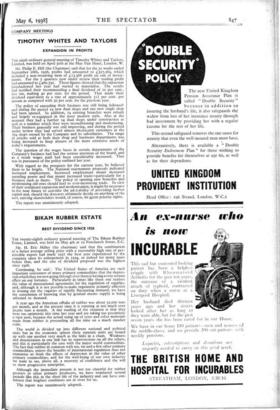COMPANY MEETINGS
TIMOTHY WHITES AND TAYLORS
EXPANSION IN PROFITS
THE ninth ordinary general meeting of Timothy Whites and Taylors, Limited, was held on April 30th at the May Fair Hotel, London, W.
Mr. Philip E. Hill (the Chairman) said that for the 52 weeks ended September 26th, 1936, profits had amounted to £327,369, which included a non-recurring item of £13,368 profit on sale of invest- ments. For the 5 quarters now under review their trading profit had amounted to £4643,332. Those figures showed that the expansion foreshadowed last year had started to materialise. The results had justified their recommending a final dividend of to per cent., less tax, making 40 per cent. for the period. That made their dividend equivalent to a rate of approximately 311. per cent, per annum as compared with 30 per cent, for the previous year.
The policy of extending their business was still being followed, and during the period 19 new dual shops and one new single shop had been opened. In addition, 14 existing branches were rebuilt and largely re-equipped in the most modern style. Also at the moment they had a further 14 dual shops under construction as well as a number which they were reconditioning and modernising. Their business generally was still improving, and during the period under review they had served almost 66,000,000 customers at the 764 shops owned by the Company and its subsidiaries. The range of articles sold at both their drug and hardware departments was being increased to keep abreast of the more extensive needs of today's requirements.
The question of the wages bases in certain departments of the Company's business had had the serious attention of the board, and as a result wages paid had been considerably increased. That was in pursuance of the policy outlined last year.
With regard to the prospects for the current year, he believed them to be bright. The National rearmament proposals indicated increased employment. Increased employment meant increased spending power and that meant increased trade—particularly for a business such as theirs. The policy of opening new branches and modernising old ones should lead to ever-increasing trade. In view of their continued expansion and modernisation, it might be necessary in the near future to consider the advisability of providing further capital and, should the directors ultimately decide on anything of the sort, existing shareholders would, of course, be given priority rights.
The report was unanimously adopted.


































































 Previous page
Previous page